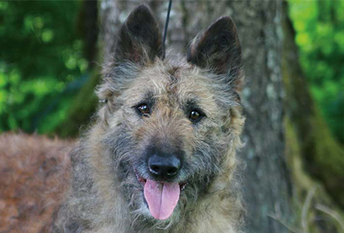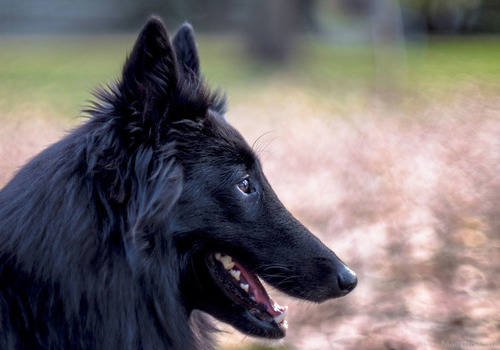The Belgian Sheepdog’s double coat sheds dirt, but he will need weekly brushing to remove dead hair. Be sure you brush all the way down to the skin, using a technique called “line brushing.” Your dog’s breeder or a groomer can show you the most efficient approach. You’ll also want to trim the hair between the paw pads using blunt-tipped scissors or electric clippers. Keep a medium-size pin brush, slicker brush, undercoat rake, and a mat comb on hand. The Belgian Sheepdog Club of America has tips on grooming in its online puppy manual.
Belgian Sheepdogs shed once or twice a year and will need more frequent brushing during those times to control the amount of loose hair floating around (there will be bags full!). Lucky you if your Belgian lives in a warm climate: he won’t shed quite as much as his kin in colder climes.
Check the ears on a weekly basis for signs of infection, irritation, or wax build up. Cleanse regularly with a veterinarian-approved cleanser and cotton ball. Brush the teeth at least once per week to prevent tartar buildup and fight gum disease. Additionally, nails should be trimmed once per month if the dog does not wear down the toenails naturally.
This dog is better suited for the outdoors and the active life it brings. Living on a farm will be natural to the Belgian Malinois because there’s plenty of opportunity for exercise and play. The dog can live in apartments, but this will require a good habit of outdoor exercise in order to get the Belgian Malinois its fair share. This dog likes being free from the leash when you know it’s safe for it to be so, which is best done on your own private property.
With this said, Belgian Sheepdog puppies should not be given too much exercise because their joints and bones are still growing and too much pressure on them could result in causing a dog a few problems later on in their lives. They should not be allowed to jump up or off furniture nor should they be allowed to run up and down the stairs because this puts too much pressure on their still growing joints and limbs.
If you get a Belgian Sheepdog puppy from a breeder, they would give you a feeding schedule and it's important to stick to the same routine, feeding the same puppy food to avoid any tummy upsets. You can change a puppy's diet, but this needs to be done very gradually always making sure they don't develop any digestive upsets and if they do, it's best to put them back on their original diet and to discuss things with the vet before attempting to change it again.
Older dogs are not known to be fussy or finicky eaters, but this does not mean you can feed them a lower quality diet. It's best to feed a mature dog twice a day, once in the morning and then again in the evening, making sure it's good quality food that meets all their nutritional requirements. It's also important that dogs be given the right amount of exercise so they burn off any excess calories or they might gain too much weight which can lead to all sorts of health issues. Obesity can shorten a dog's life by several years so it's important to keep an eye on their waistline from the word go.
Treatscan be an important aid in training, but giving too many can cause obesity. Learn about whichhuman foodsare safe for dogs, and which are not. Check with your vet if you have any concerns about your dog’s weight or diet.Clean, fresh water should be available at all times.
The Belgian Sheepdog is a robust, healthy breed.Responsible breederswillscreentheir breeding stock for health conditions such as epilepsy, elbow andhip dysplasia, eye issues such as progressive retinal atrophy and cataracts, and certain cancers. Should the need for surgery arise, note that Belgians are particularly sensitive to anesthesia. As with all breeds, a Belgian’s ears should be checked regularly for signs of infection, andthe teethshould be brushed regularly.
Training is important to this breed. Proper training, a consistent set of boundaries and discipline, and a master with a good presence of mind will all be important. This dog is not like the Golden Retriever, where training and socialization can be quite easy. Instead, the Belgian Malinois can be territorial and fearful of strangers if not raised properly and will become uncooperative if not trained for obedience.
When trained properly, there are few dogs more loyal and obedient than the Belgian Malinois. As long as you can demonstrate authority over this dog, you should be fine. If this worries you, another breed might be more appropriate.
Puppies should be properly socialized to develop the amiable, outgoing personality that is characteristic of the breed. They’re successful in performance and companion events such as earthdog, barn hunt, obedience, and agility.











